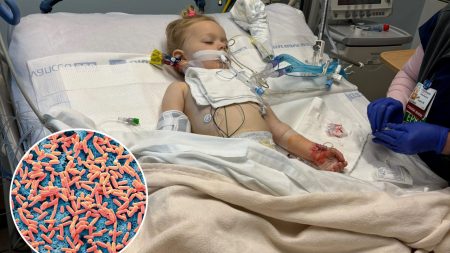Talia Smith, a 44-year-old woman once brimming with vitality and maintaining a rigorous seven-day-a-week workout routine, now faces a drastically altered reality. Confined to a wheelchair and receiving palliative care in a hospice, she requires round-the-clock assistance for basic survival. This devastating turn of events was triggered by a seemingly routine visit to her doctor for a urinary tract infection (UTI). Prescribed what she believed to be a standard course of antibiotics, specifically Ciprofloxacin (commonly known as Cipro), Talia unknowingly embarked on a path that would irrevocably change her life. After just three doses, she experienced debilitating symptoms: an inability to walk, pervasive body aches, vision changes, and difficulty swallowing. An emergency room visit revealed the shocking truth – the antibiotic she had been assured was safe carried serious risks, highlighted by a “black box warning” from the Food and Drug Administration (FDA).
Cipro belongs to the fluoroquinolone class of antibiotics, a group known for their potential to cause severe and permanent side effects. In the UK, their prescription is restricted to cases where no other antibiotic is suitable. The FDA has issued multiple black box warnings, the strongest cautionary measure short of a ban, emphasizing the risks of tendon ruptures, nerve damage, and muscle wasting associated with these drugs. Tragically, Talia was unaware of these dangers, as her doctor had failed to disclose them. This omission had catastrophic consequences, transforming her from a vibrant, active individual to someone entirely dependent on others for care. Her rapid decline saw her weight plummet to a mere 82 pounds within months, requiring constant assistance for even the simplest tasks like eating.
This devastating transformation has not only impacted Talia’s physical well-being but has also reversed her role within her family. Previously the caregiver for her disabled veteran husband, Tim, she is now the one in need of constant support. The emotional toll of this role reversal is profound, compounding the physical suffering she endures. Despite the immense challenges, Talia has channeled her experience into advocacy, using the social media platform TikTok to share her story and warn others about the potential dangers of antibiotics, particularly fluoroquinolones. Her candid posts, detailing her ongoing struggle, have resonated with a vast audience, garnering over 1.4 million likes.
Talia’s message emphasizes the crucial importance of informed consent and encourages individuals to actively question their doctors about prescribed medications. Her advocacy extends beyond raising awareness online. She has been instrumental in the groundbreaking recognition of “fluoroquinolone adverse effects,” also known as “floxing,” as a reportable medical condition by the Centers for Disease Control and Prevention (CDC). This milestone achievement, slated for implementation in October 2025, will enable doctors to officially document floxing cases, facilitating insurance reimbursements, disability claims, and a deeper medical understanding of this condition. This recognition is a significant victory for Talia and countless others who have suffered from fluoroquinolone toxicity, marking a turning point in their fight for acknowledgement and support.
Beyond floxing, Talia’s ordeal has also led to the development of Mast Cell Activation Syndrome (MCAS), a condition triggered by fluoroquinolone toxicity. This further complicates her health, restricting her diet to a mere six foods and requiring meticulous microdosing of any new additions to avoid severe reactions. The unpredictable nature of MCAS adds another layer of complexity to her daily life, demanding constant vigilance and management. Despite the relentless challenges posed by both floxing and MCAS, Talia remains resolute in her determination to make a difference. Her unwavering spirit and commitment to advocacy serve as an inspiration, underscoring the importance of patient awareness and responsible antibiotic prescribing practices.
Talia’s story serves as a stark reminder of the potential consequences of antibiotic overuse and the critical need for open communication between doctors and patients. Her message is clear: question, research, and advocate for your own health. Don’t blindly accept prescriptions without understanding the potential risks and benefits. This cautionary tale highlights the devastating impact that a seemingly routine prescription can have, transforming a healthy, active individual into someone facing a life-altering struggle. Talia’s experience underscores the urgent need for greater awareness and more cautious prescribing practices to prevent similar tragedies from unfolding. Her tireless advocacy efforts are a testament to her resilience and her commitment to ensuring that others don’t suffer the same fate.











